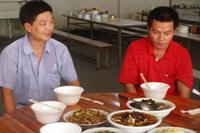
Along the Pearl River: Manufacturing, a Multi-Course Meal, and a Meta Narrative

Factory chef, left, and the film crew's driver, eat lunch
The “Meat World: China” crew wrapped up the film’s three-week shoot in Guangdong province in southern China. They toured a computer parts factory and interviewed the chef in the industrial city of Dongguan, on the Pearl River. Then they travelled further north to their final stop, Guangzhou, a port in the Pearl River Delta and the provincial capital, where they had a spirited dialogue about meat and morals during an epic dinner’nearly five hours’ long, ending just before midnight. “The waitresses were very angry at us,” director Jian Yi says, “because we stayed so long and because we were so loud.” But before that dinner, a factory lunch. As the crew filmed, the chef cooked leafy greens and then meat in a set of large woks. One reason factory-style pig facilities have expanded in coastal Guangdong is to meet demand for pork from the province’s numerous factories. Each employs hundreds of workers (sometimes more) who eat lunch each day in the factory canteen. Neither the chef nor the workers Jian Yi interviewed had heard about the role of meat and dairy in global warming; the crew’s driver was perhaps the most surprised of all.
In Guangzhou, Mr. and Mrs. Wang, a middle-class couple in the 30s and long-time friends of Jian Yi, were the final interviewees. “We filmed their new big apartment,” Jian Yi writes, “and had a dinner together. The conversation was very interesting.” Both Wangs are meat lovers, Jian Yi explains, and they have a philosophy about it, too. Every night they boil half a kilogram of pork (about a pound). In the morning, they throw the meat away and drink the juice. They’ve been doing this for years and see it as effective for keeping themselves healthy.
 |
“They debated with us on all the issues we raised’food security, public health, animal welfare’but the only point that changed them was how meat consumption and production have contributed to global warming,” Jian Yi writes. “They were very shocked by this.” Then something unanticipated happened, a fascinating verité moment documentarians the world over yearn to capture. “This issue of eating meat touches on everyone so much so that the dynamic of the crew changed daily,” Jian Yi explains. “When we brought out moral issues of meat consumption, the rest of the crew felt offended. Therefore, I took the camera and started to film them debating and talking about how the filming has changed them, or not,” Jian Yi says.
“Everyone was shouting at each other. The crew had so much to say. These issues really touch on everybody.” Jian Yi adds: everyone was loud, including him. Especially him. “I shouted….[and] we stayed so late that we almost had to climb out of the locked restaurant.” We discuss including this meta-narrative, how what they filmed affected the crew, as part of the narrative. “It will be a very interesting part of the film, I believe, perhaps as interesting as, if not more than, the rest of the footage,” Jian Yi says.
 |
“Apparently, everyone enjoyed the process, though sometimes bitter, and got a lot out of it,” Jian Yi writes. “My partner Song and I certainly had not expected that we would become vegans!” (During the course of the shoot, Jian Yi celebrated his birthday with a vegetarian dinner for friends…his first time celebrating his birthday this way.) He adds: “We too appreciate this opportunity to explore this issue, and more importantly, to start reflecting on our own eating habits and debating among ourselves what is good for ourselves and the planet.”
We (co-producers Susannah Ludwig, Karin Chien and I) want to thank Jian Yi and all of the crew members for their diligence, creativity, craft, and deep engagement. It’s been an extraordinary collaboration. I’ve just begun to watch the footage, 40 hours, on external hard drives hand-carried from China. It’s absorbing, wrenching, often beautiful, enveloping and riveting’without any translation.
 Brighter Green
Brighter Green



